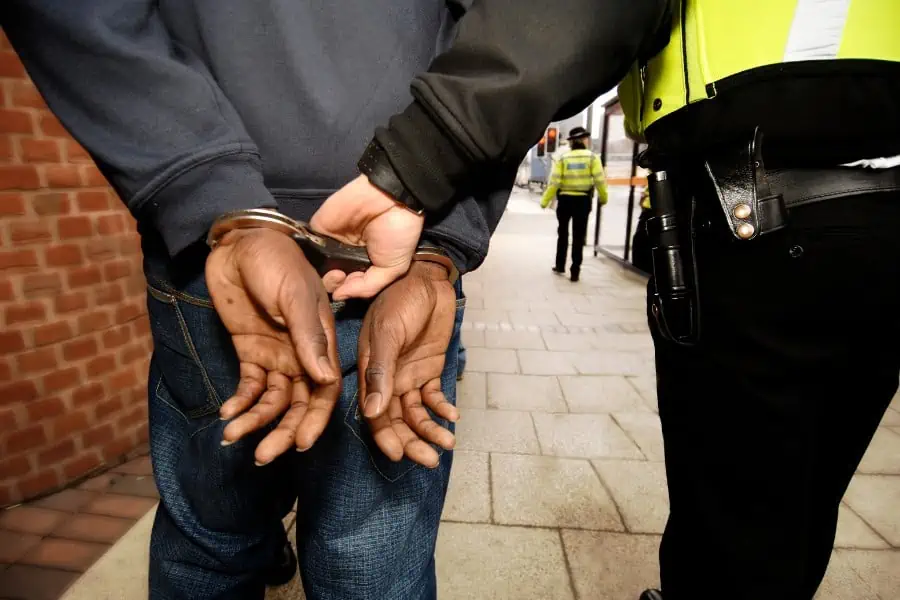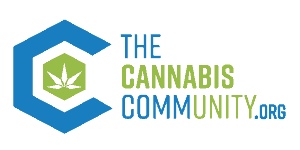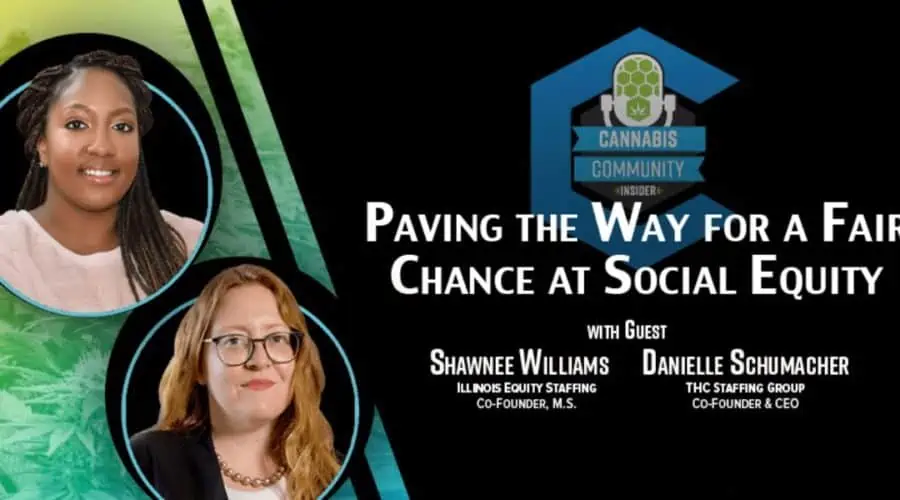2nd Chance Initiative for Justice System Impacted Americans
Join our host Penelope Hamilton as she brings you the inside conversation on how two women are creating a path in the cannabis industry for all minorities with their 2nd Chance Initiative for Justice System Impacted Americans initiative.
Social Equity in Cannabis

Social Equity in the cannabis industry will remain a dream if not for passionate people like today’s guests. Shawnee Williams is the co-founder at Illinois Equity Staffing, a Minority Black and women-owned firm based in Chicago that supports the cannabis industry in education, job placement, human resources, payroll, and social equity & diversity compliance.
Shawnee has teamed up with Danielle Schumacher, CEO of THC Staffing Group – a DEI recruiting and consulting firm – founded in 2014. Together these organizations are creating equity through their extensive guidance and training and a new project called The 2nd Chance Initiative for Justice System Impacted Americans.
Listen to how they are knocking down roadblocks and creating a map that other states can use to navigate through legalization.
Table of Contents
Introduction (0:04 – 0:45)
- Penelope Hamilton is the host of “The Cannabis Community Insider” show
- The show aims to highlight the efforts made by advocates and states to achieve social equity and racial justice reform in the cannabis industry
- Hamilton introduces Shawnee Williams and Danielle Schumacher, who are guests of the show
- Williams is the co-founder of Illinois Equity Staffing, a minority and women-owned firm based in Chicago that supports the cannabis industry in education, job placement, human resources, payroll, and social equity diversity compliance
- Schumacher is the CEO of THC Staffing Group and her mission is to perpetuate diversity and inclusion in the legal cannabis industry
- Williams and Schumacher are collaborating and partnering on the Second Chance Initiative for the cannabis industry
The Second Chance Initiative (116 – 412)
- Williams and Schumacher are working together on the Second Chance Initiative for the cannabis industry
- The initiative aims to foster more diversity, inclusion, and equity in the cannabis industry through job opportunities
- The initiative focuses specifically on those who the justice system in America has impacted
- The idea for the initiative came up when Williams and her business partner Lynette Johnson were looking for ways to impact the cannabis industry without having to wait for legislators to give them what they were asking for
- The initiative started with a conversation with Purely, a cannabis company that agreed to have 10% of their workforce come from the population impacted by the justice system
- Williams and Schumacher have been working in several states including Illinois, Ohio, Michigan, New York, Massachusetts, New Jersey, Oregon, Nevada, Arizona, and California to bring people impacted by the justice system into the cannabis industry in whatever way they can
- The initiative is not just for entry-level positions but also for positions up to the c-suite level
- Williams and Schumacher have been collaborating with several cannabis companies to achieve the initiative’s goal of fostering diversity, inclusion, and equity in the cannabis industry through job opportunities
Barriers to entry in the cannabis industry 06:53
- The Illinois Equity Staffing initiative aims to bring on ancillary companies that aren’t plant touching in the cannabis industry to reduce barriers to entry.
- The badging process for working in the cannabis industry varies from state to state.
- The goal is to take what’s learned in the case studies to the legislative level at each state they are working in, as well as the national level, to ensure that there are no barriers to entry in the future.
Overcoming compliance and regulatory challenges 07:33
- Working in multiple states with different compliance and regulatory requirements can be challenging.
- Each state has its own issues, so Illinois Equity Staffing is working with non-profit organizations familiar with each state’s law and local human resource teams to understand the nuances of each state’s law and gray areas.
- CuraLeaf, a larger company, is helping Illinois Equity Staffing to navigate the process in each state.
Understanding state-specific badging requirements 07:48
- Each state has its own definition of what’s considered acceptable to work in the cannabis industry.
- There’s a need to be on the same page when it comes to legislation, especially when it comes to national legalization.
- Illinois Equity Staffing is working with organizations and people already working with this population and Cure Leaf’s local human resources teams to understand the nuances of each state’s law and gray areas.
Examples of state-specific nuances 08:30
- Charges considered violent in one state might not be violent in another.
- Non-violent charges in one state might prevent someone from working in the cannabis industry, but not in another state.
- Illinois has a violent charge requirement that prevents individuals with charges from working in the cannabis industry, which creates unnecessary arbitrary boundaries for people who built the industry.
Social equity licensing and employment barriers 12:07
- Social equity definitions apply to ownership, but not necessarily employment.
- Illinois has social equity definitions for ownership, but barriers for employment.
- It’s complicated and will take time to work through whatever system is in place in each state or jurisdiction.
The need for case studies 13:18
- As an MSO, Cure Leaf has a duty to provide case studies to help legislators understand the real issues experienced by people in the cannabis industry.
- The goal is to take the case studies to the national level and enact change because the laws affect more people than legislators realize.
Understanding Equity vs. Equality 14:14
- Equity is the idea of providing support to those disproportionately impacted by the war on drugs so that they have the necessary support to compete on a level playing field.
- Equality, on the other hand, means treating everyone the same.
- Minorities have been affected disproportionately by the law on drugs, which has created an invisible wall around them, preventing them from accessing things such as education, funding or loans, voting rights, housing, and employment.
- Equity aims to remove these barriers and give the affected population the necessary support to compete and get the same opportunities as everyone else.
The Need for Equity in the Cannabis Industry 14:30
- 70 million people have been affected by the criminal justice system in America.
- This includes those incarcerated or with a criminal record and everyone in their immediate family and support system.
- Social equity aims to provide equity to everyone most impacted by policing, over-policing, incarceration, lack of health care, education, and housing.
- The cannabis industry can provide a means to reinvest in communities most impacted by the war on drugs.
- It is not just about providing ownership opportunities to those affected but also about providing a better quality of life for the affected communities.
- Companies have an obligation to provide equity in the cannabis industry due to the history of minorities being disproportionately impacted by the law on drugs.
The Hypocrisy of the Cannabis Industry 16:42
- The cannabis industry is not new; it has existed for as long as humans have.
- However, the industry has recently become legal and taxed, creating a multi-billion dollar profit industry.
- Communities of color have been over-policed and prosecuted for minor offenses that should not have been a crime in the first place.
- The industry’s inherent hypocrisy is that thousands of people of color, primarily black, brown indigenous people, are still locked up for things that white people are starting to make money from.
- As more money comes into the industry, the problem will only become bigger and more challenging to fix.
- Dismantling this issue will take many lifetimes of work to make it right.
Ownership in the Cannabis Industry 15:39
- Ownership in the cannabis industry is not necessarily generational wealth; debt ownership comes with much legal risk.
- Those already in the legal system have had a bad experience and may not want to take on the high-risk form of ownership or employment.
- Not everyone most impacted by the war on drugs will want to work in the cannabis industry.
Providing Support to the Affected Population 16:17
- Equity is not just about providing ownership opportunities to those affected by the war on drugs, but also about providing a better quality of life for the affected communities.
- The cannabis industry can provide a means to reinvest in communities most impacted by the war on drugs.
- The goal is to remove barriers and give the affected population the necessary support to compete and get the same opportunities as everyone else.
Illinois Equity Staffing: An Overview 17:13
- Illinois Equity Staffing was founded in 2010 by Danielle and her co-founder.
- They started focusing on the fact that the cannabis industry was turning into a multi-billion dollar profit industry. At the same time, thousands of people of color were still locked up for minor offenses.
- Illinois Equity Staffing provides online training to give everyone a step stool to bring them back up to a level playing field.
Illinois Responsible Vendor Training 20:44
- Illinois Equity Staffing is a responsible vendor for the state of Illinois.
- They train District 3 agents who have gotten jobs in the cannabis industry in Illinois.
- They train them to get their free agent card.
- They also have online training, but they specifically work with a local college in Chicago called Harvey College.
- They teach classes there.
Local College Partnership 20:55
- Illinois Equity Staffing partners with Harvey College to work with the same population they’re trying to help.
- They work with those who were disproportionately impacted by the war on drugs.
- They started on the advisory board with the college and developed curriculum.
- They teach classes there along with other folks working on their team.
Tools for Success 21:32
- Illinois Equity Staffing ensures everyone has all the tools or keys to success.
- They want to ensure that everyone knows the plant so that they can go out and compete with others.
- They teach several classes, including intro to cannabis and entrepreneurship and cannabis.
Importance of Ancillary Businesses 22:11
- Illinois Equity Staffing works with folks who have been disproportionately impacted and makes sure they know about ancillary businesses.
- They help people understand that many other opportunities have nothing to do with licensing.
- They believe that ancillary businesses can create generational wealth for people and their families.
Social Equity 24:24
- Illinois Equity Staffing believes that social equity is not something you can check off a list like inclusion.
- It is not a point in time that you reach and your work is done.
- They believe plenty of work still needs to be done, and social equity will not happen overnight.
- Ownership needs to be in the hands of most impacted people.
- They believe that white folks have not been most impacted.
- They want to see more diversity in the industry and white ownership to be maybe 10%.
- They believe that companies need to support social equity work.
- The change will not happen overnight, but the more companies that are doing it, the better.
Opportunity for Justice-Impacted Communities 27:01
- Justice-impacted communities are typically the most loyal and hard-working populations regarding diverse groups.
- The 2nd Chance Initiative with Illinois Equity Staffing aims to allow this population into the cannabis industry.
- Those interested in participating can check out the Illinois Equity Staffing website or reach out via email or social media.
Raising Awareness 27:50
- Many people are unaware of the barriers to entry in the cannabis industry, particularly for justice-impacted communities.
- Spreading awareness and passing on information about the 2nd Chance Initiative can help people understand the industry’s underbelly.
- Those working with justice-impacted individuals can spread the word and inform their clients about available opportunities.
Involving Justice-Impacted Americans 29:12
- The 2nd Chance Initiative is the first of many organizations that intend to involve justice-impacted Americans in the cannabis industry.
- The moment ancillary businesses start thinking intentionally about this community, there will be new ground to break.
Programs and Conferences 29:50
- The 2nd Chance Initiative is top of mind for Illinois Equity Staffing, and they will ensure that people know about it during programming and conferences.
- Danielle plans to attend the Camacho conference in Chicago or Rosemont and the Black Cannabis Conference in New Orleans.
- She also serves on the National Cannabis Industry Association National Human Resources Committee.
Workforce Evolution 30:46
- The workforce is shifting and evolving, and June 2021 saw a record number of resignations in America.
- Employees understand that work-life balance and overall happiness rely on what they do for a living, and some toxic environments are not worth it anymore.
- Illinois Equity Staffing ensures that every employee has a great workplace and experience.
Personal Life 31:47
- Danielle recently had a newborn named Josiah, who rules her life.
- Despite her busy schedule, she wants to ensure that she has an outstanding work-life balance and can care for her family.
Mentoring Program and 10-year Plan 34:12
- THC Staffing has a mentoring program as part of their 10-year plan since its founding in 2014.
- The mentoring program is one of their big projects this year and has been in development for a few years.
- The program is an important step towards equity, as mentorship is crucial in the cannabis industry.
- THC staffing is between five and ten years old and has to ensure that they meet their big picture goals.
- The program aims to help people who feel lost or do not know how to start, by pointing them in the right direction.
Tax Revenue Allocation 35:32
- Some states like New York are going to have grant money from the revenue taxes to go into programs like what Illinois Equity Staffing is doing.
- However, the tax revenue in Illinois mostly went to state and municipal departments and organizations.
- Danielle and Shawnee express their disappointment that the tax revenue did not go where it was supposed to go.
- They say that the paper sounds great but the execution is not what they had hoped for.
Social Equity Incubator 37:21
- The city of Oakland has a social equity incubator that helps social equity businesses share space and equipment for manufacturing.
- The incubator is a shared manufacturing space that helps overcome one of the biggest barriers in the industry, which is real estate and equipment.
- The city of Oakland also has a grant program that covers paid training for workforce development training for cannabis.
- The grant money is going towards a track for employment, which is an excellent initiative.
Social Equity Licensee Definition 38:34
- The city of Oakland has a social equity licensee definition that is very problematic, limiting social equity programs to a few.
- Illinois and other states have similar issues with their social equity programs.
- It is challenging to define who qualifies and what kinds of assistance they receive throughout the entrepreneurial process.
- The city of Oakland has a definition for social equity worker, which is another initiative that could have a huge impact.
How to find information about the initiative 40:48
- The website for Illinois Equity Staffing is www.illinoisequitystaffing.com.
- To find information about the initiative, visit illinoisequitystaffing.com/initiative-faq.
- The company is also on social media platforms such as LinkedIn, Facebook, and Instagram, where they can be messaged or contacted.
- You can also email them at [email protected].
How to contact THC Staffing 41:29
- THC Staffing can be found on Instagram and Twitter under the handle @thcstaffing.
- Their website is thcstaffinggroup.com.
- For the 2nd Chance Initiative, use the contact information provided by Illinois Equity Staffing.
- THC Staffing can also be contacted through their website, where you can submit a resume for general consideration or for a specific job listing.

